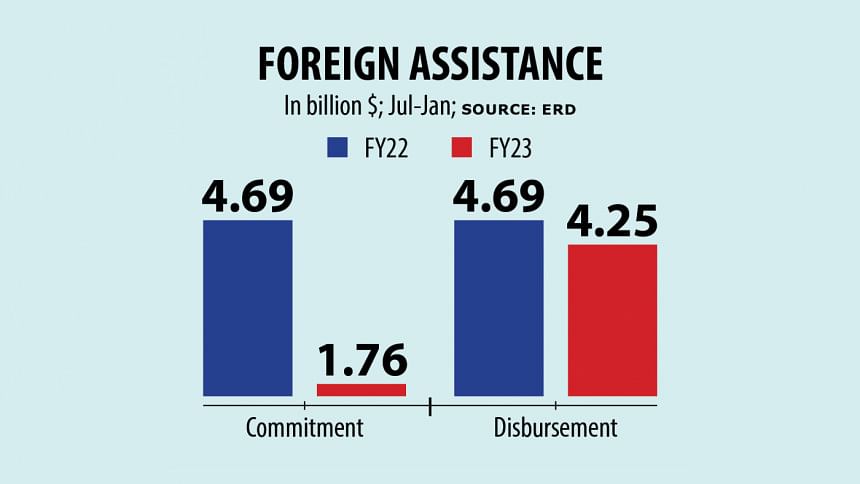Foreign aid disbursement, commitment decline

Commitments and disbursements of foreign assistance for development projects in Bangladesh fell in the July-January period of the current fiscal year, which may deepen the pressure on foreign exchange reserves.
The commitments declined by around 62 per cent year-on-year in the first seven months of the current fiscal year from $4,698 million, according to data from Economic Relations Division (ERD) of the finance ministry.
Meanwhile disbursements slipped 9 per cent year-on-year to $4,259 million.
Seeking anonymity, an ERD official said the decline was an outcome of the global economic crisis alongside a go-slow strategy of the government and development partners.
Compared with last fiscal year, the arrival of a lower budgetary support for Bangladesh resulted in the lower disbursement, he added.
However, this situation may improve in the coming days at the end of the fiscal year, he said.
The declining trend of both commitments and disbursement are not "good" for the foreign reserves, said Prof Mustafizur Rahman, a distinguished fellow at the Centre for Policy Dialogue, on being contacted by The Daily Star.
An ERD official said the decline was an outcome of the global economic crisis alongside a go-slow strategy of the government and development partners
"The lower commitment creates a midterm effect while the lower disbursement may create immediate pressure on the foreign reserve," he said.
The financial accounts also showed the deficit, which is not good for the reserve, he said.
"Although we now have strength in the pipeline, we cannot use this fund properly. A few days ago, the government vowed to utilise its own funds, which is not correct," Rahman added.
"This is the time to utilise the foreign funds. If we can speed up the utilisation, it will bring a positive impact on the country's foreign reserve," he said.
About the fall in commitments, the economist said the prioritisation of select mega projects may also be a reason.
Japan disbursed the highest, $1,041 million, followed by World Bank ($695 million), Asian Development Bank ($638 million) and China ($563 million).
However, the government repaid $1,284 million of foreign debts in the first seven months, whereas it was $1,221 million during the corresponding period in the previous fiscal year, the ERD data showed.

 For all latest news, follow The Daily Star's Google News channel.
For all latest news, follow The Daily Star's Google News channel. 



Comments